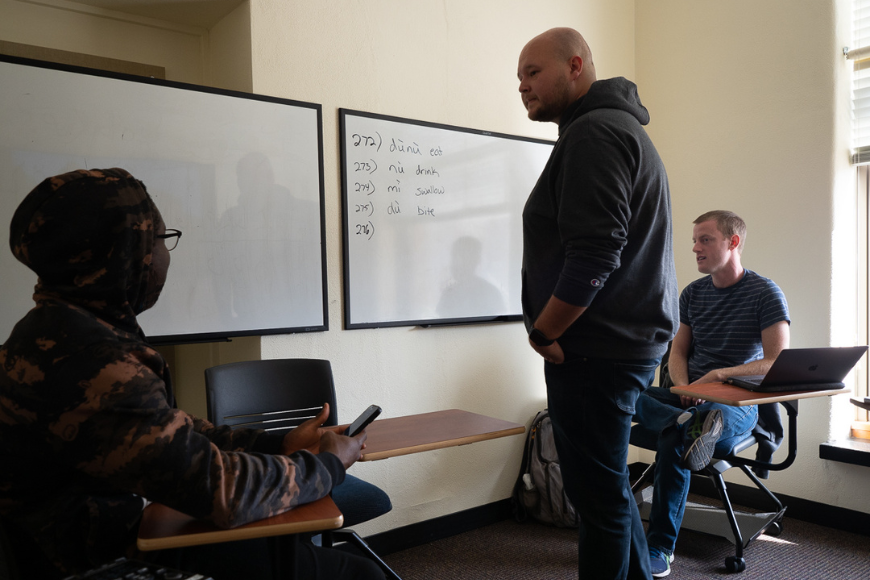Reading Groups

The Institute of Linguistics organizes several informal reading groups around specific subfields or topics. Groups typically have at least one student and one faculty member responsible for organization, which involves planning and running meetings, finding volunteers to lead discussions, and choosing papers; specific topics are often tailored to participants’ interests. It is an excellent opportunity for students to develop their knowledge about specific topics in the company of other interested students and faculty. Reading groups typically meet once every two weeks, and are scheduled via a poll each semester. (Participants do not need to commit to attending every meeting).
Not all reading groups run every semester, but you can read more about our typical reading groups below. If you are interested in joining any of these reading groups, please email ling@umn.edu to be added to the group's mailing list and put in contact with the current organizer(s).
The Computational Linguistics Reading Group meets to read and discuss current research in Computational Linguistics and Natural Language Processing (NLP) and to occasionally get hands-on experience with the latest NLP tools and libraries. Many semesters the group explores a specific topic in depth (e.g., BERT, Large Language Models, and the technology underlying ChatGPT).
Linguists scientifically study human language data, and as is the case with any science, the quality of the data is extremely important for accurate results. In the Fieldwork Reading Group, we will study both strategies in collecting robust natural language data through fieldwork as well as research in methodology and theory for analyzing and processing collected data. There are many hats a fieldworker needs to don, and there are several components to a successful fieldwork experience (connecting and working with consultants, formulating a wide array of tasks specifically suited to the type of desired data, using multimedia data collection techniques, administering tasks correctly, interpreting the data, running robust follow-up sessions for quality control, storing and managing the data, proper use of equipment, etc.).
In addition to papers focused on fieldwork and methodology, we will also tackle theoretical readings, so as to learn the skills of making effective theory-oriented tasks that crucially put predictions of influential theories to test, thereby making both empirical and theoretical contributions to the field.
Beyond reading papers together, students working on projects that incorporate fieldwork can use this venue at any stage to present their work in an informal setting and get feedback on all aspects of methods and theory. This group is meant to facilitate a thriving community of fieldworkers in the Institute of Linguistics, across many different linguistic subfields, language families, and research topics.
The goal of this group is to create a space for students, faculty, language teachers and community members interested in learning, reading, or researching about the Hmong language to get together and to support each other. The group is open to the UMN community, researchers at other institutions, language teachers, and community members. The activities will be responsive to the interests of the regular participants of the group. Meetings will be held via Zoom.
This reading group explores the intersection of linguistics and social justice, with the aim of expanding our understanding of our roles as academics in either perpetuating or dismantling linguistic injustices—and injustices within the field of linguistics. We will read papers primarily from the field of sociolinguistics, but will also read about and discuss the interaction of these sociolinguistic concepts with linguistic theory, fieldwork, pedagogy, etc. We will aim to connect these readings directly to our own practices as linguists whenever possible.
The Syntax and Semantics Reading Group (SRG) has the longest history of the current Institute of Linguistics reading groups. Our group is a space of analytical discussion for community members who have interests in syntactic and semantic theories. We read and examine selected theoretical papers/articles based on our members’ preferences, often building on a semester-long topic or theme. We also serve as a venue for practice talks and student presentations.
The Algonquian Languages Reading Group is a place to discuss anything and everything relating to Algonquian languages. The format is flexible and adapts to the needs and interests of participants, and activities range from discussing theoretical papers to hosting hands-on software workshops to just hanging out and discussing the various things that we are working on or interested in. It is also a space for people to get feedback on their work or to prepare for upcoming talks. The group is open to anyone with even a passing interest in Algonquian Linguistics!